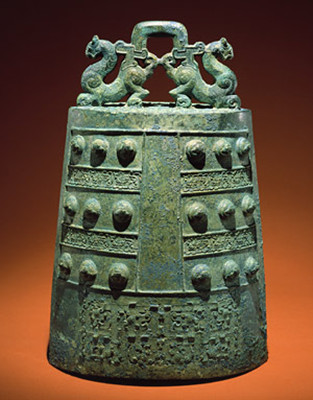Bells in China go back about five thousand years.
钟在中国已有超过五千年的历史。
The earliest would have been simple hand bells, with a clapper inside to produce the sound.
最早出现的应该是简单的手铃,内有铃舌发声。
Later the clapper was abandoned, and bronze bells were played by being hit on the outside with a hammer.
之后人们舍弃了铃舌,改用槌子敲击铜钟外壁。
Our single bell would once have been part of a set of either nine or fourteen.
本文的铜钟所属的钟组可能一套九口,也可能一套十四口。
Each would have been a different size, and would produce two different tones, depending on where it was struck.
每口大小不一,因敲击部位的不同各能发出两种不同的音调。
We asked the famous percussionist Evelyn Glennie to come and have a look at our bell, and to talk about the power of bells:
打击乐手伊芙琳格伦尼女爵士十分了解铜钟的魅力:
"Every single bell has its own unique sound.
每口钟的声音都独一无二。
It can be a very tiny sound that you've really got to pay attention to, or it can just be a huge, huge resonant experience that a whole community can register.
可能是极细微、需要凝神靜听的声音, 也可能极为宏大响亮,整个社会都能共赏。
I remember in the early years when I went to China, and they had a whole rack of bells that decorated the back of the stage, and of course I couldn't help but go up to them and just admire the craftsmanship that went into this huge, huge structure.
我还记得早年我去中国演出的时候,他们摆了一整架的铜钟作为舞台背景的装饰。
However, I did ask if I could possibly strike one, and I was given this long wooden pole, and of course the whole body has to be implemented in order to create a sound, and the right striking point is particularly important.
我情不自禁走上前去欣赏它们的工艺水平,并请求试敲一下。他们给了我一根长木槌,我用尽力气才能让钟发出声音:找准落槌点至关重要。
And I think there was this immense respect as to what actually I was going to do, you know.
敲击前我心中充满敬意。
It wasn't just a case of, Well, hit the bell, or something.
我并不是抱着随便玩乐的心情,而是把它当作极为宝贵的机会。
This was something that I wanted to really treasure, and it was an incredible experience to just create that one strike, and then to really live the sound experience of the resonance after that strike had been made."
那过程十分美妙,之后我久久沉浸在钟声的回响之中。













